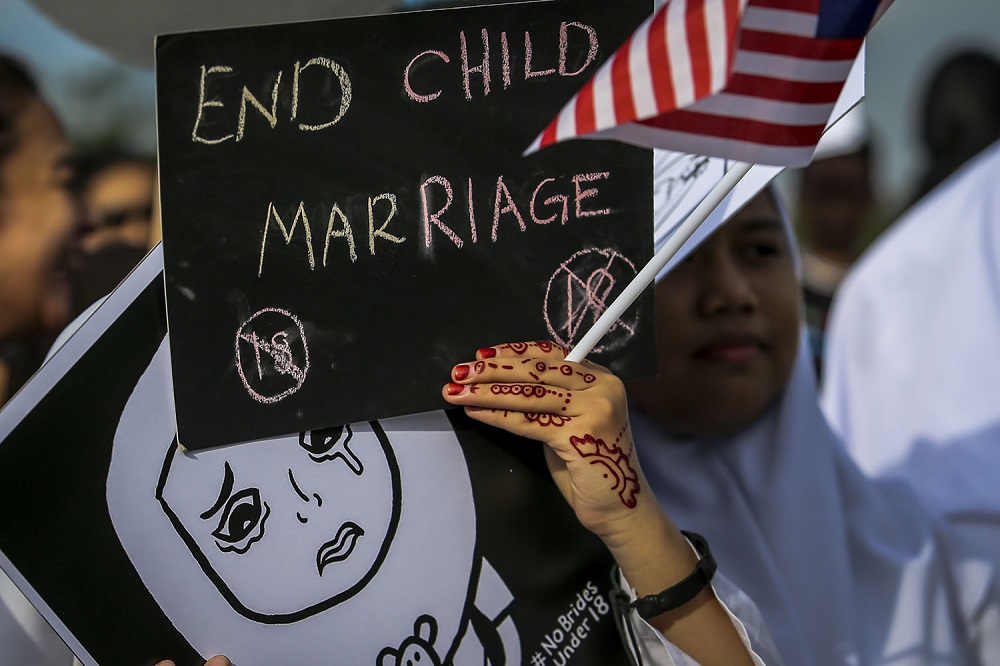KUALA LUMPUR, March 10 — While much is being done by United Nations Children’s Fund (Unicef) stakeholders, youth groups, ministries and watchdogs around the world to end child marriage, the Covid-19 pandemic has posed a serious threat to this progress.
Unicef’s findings released on International Women’s Day warned that school closures, economic stress, service disruptions, pregnancy, and parental deaths due to the pandemic are putting the most vulnerable girls at increased risk of child marriage worldwide.
Chief of Child Protection at Unicef Malaysia, Sarah Norton-Staal, said this was evident during the pandemic, especially since fewer children attended school and parents’ bid for financial survival resulted in them considering marrying their children off as a solution.
Worryingly, Unicef said such changes increase the likelihood of child marriage over the next decade, with possibly up to 10 million more girls exposed as a result of the pandemic.
Even before the Covid-19 outbreak, 100 million girls worldwide were already at risk of child marriage in the next decade, despite significant reductions in several countries in recent years.
“The current data available is not comprehensive and there are issues about registration of marriages, thus trying to ascertain exact numbers and patterns is difficult.
“However, it appears there is an upward trend in particular as a result of the pandemic during the past year,” Norton-Staal told a group of panelist and members of the media in an online launch of Unicef advocacy brief towards ending child marriage yesterday morning.
The event was held virtually to acknowledge and renew Malaysia’s commitments in ending child marriage in conjunction with International Women’s Day and saw participaton by various stakeholders.
These included Malaysia’s Women, Family and Community Development Ministry and its Indonesian counterpart, the United Nations Population Fund (UNPFA), the Girl Guides Association Malaysia, the Human Rights Commission of Malaysia, and PACOS Trust, a non-governmental organisation specialising in native affairs.
What is the situation in Malaysia?
In Malaysia, an average of 1,500 children from various religions, ethnicities, and communities marry each year, according to Women, Family and Community Development Minister Datuk Seri Rina Harun who spoke in a pre-recorded video played during the launch.
She said this practice occurred in both urban and rural areas, among Muslim and non-Muslims, Orang Asli or indigenous people, and even amongst migrant and refugee communities.
In 2018, available data showed that 1,856 children were married, of which around 90 per cent were girls. It was also reported that between 2007 and 2017, approximately 15,000 cases were recorded.
“It is a violation of a child’s rights with negative implications, on the child’s ability to fulfill their potential and future opportunities, not least that of the girl child. The ministry’s stand is that children should always be allowed to develop their full potential,” Rina said.
“Study has shown that child marriage,can have serious long-term consequences on their health and well-being, including educational and economic opportunities.”
Why is child marriage legal in Malaysia and what is the government doing?
According to Norton-Staal, in Malaysia, it is primarily the "exceptions" to the law that allow parents to petition for their children to marry.
Authorities, both civil and religious, tend to approve these requests for "exceptional" marriages, but she argued that these exceptions should not be allowed.
Rina said, however, that Malaysia is committed to addressing child marriage, as seen in the ratification of, the United Nations Convention on the Elimination of All Forms of Discrimination against Women (Cedaw), in 1995 and the subsequent removal of the reservation to Article 16(2) about child marriage in 2010.
The government also ratified the United Nations Convention on the Rights of the Child (CRC) in 1995, in which she said it committed under Article 24(3) “to take all effective, and appropriate measures with a view to abolishing traditional practices prejudicial, to the health of the children.”
She also said In recognition of the importance of this issue, in January 2020, the government introduced a six-year National Strategy Plan in Handling the causes of child marriage.
Legislative reforms alone not enough
Amending laws alone will not end child marriage but conditions, attitudes and behaviour must also change, according to Unicef.
According to its country representative, Dr Rashed Mustafa Sarwar, the legislative issue is only one part change and there are many other factors and solutions that need to be stepped up.
“It requires a multicultural and multilevel mindset change in protecting a child from marriage. It must be our own unique effort (society and stakeholders), to end child marriage in Malaysia.
“That will bring gender equality...” he said adding 90 per cent of child marriage compromised females.
Rina also echoed addressing child marriage in Malaysia is a shared responsibility involving many stakeholders
“Child marriage is deeply rooted in society, and economic circumstances, which makes it is very difficult for individuals, or families, to end the practice on their own.
“Change has to take place across many levels of society. The best interests of children must be the motivating factor to garner support and push for reform on all fronts,” she said.
During the launch, seven areas were highlighted as contributing to child marriage: legislation that allows or facilitates child marriage; lack of access to sexual reproductive health education information and services; low household income and poverty; lack of access to education and poor school attendance; lack of access to parenting support; social norms that condone child marriage; and lack of legal status or rights for children affected by migration.
Unicef said reforms in these areas would have the most effect in preventing child marriage.



















